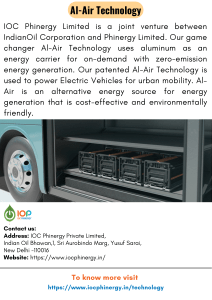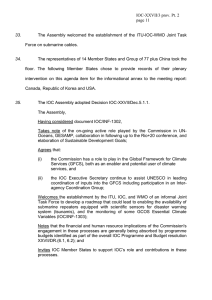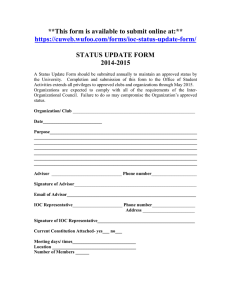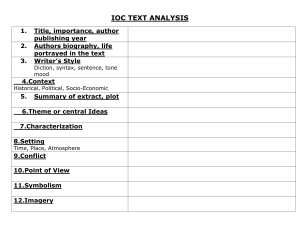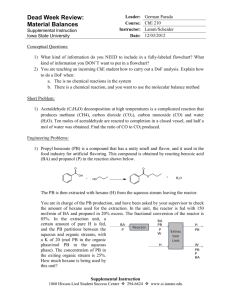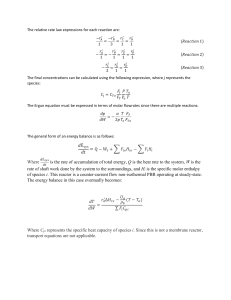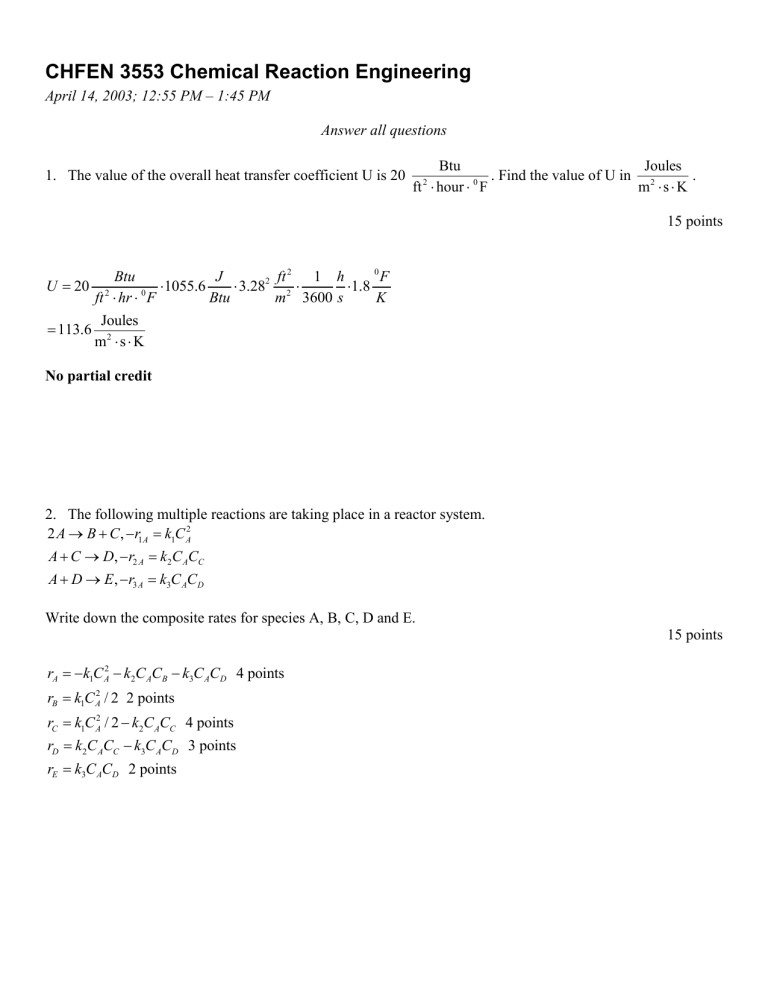
CHFEN 3553 Chemical Reaction Engineering April 14, 2003; 12:55 PM – 1:45 PM Answer all questions 1. The value of the overall heat transfer coefficient U is 20 Btu Joules . Find the value of U in 2 . 0 ft hour F m s K 2 15 points 2 0 Btu J 1 h F 2 ft 1055.6 3.28 1.8 2 0 2 ft hr F Btu m 3600 s K Joules 113.6 2 m s K U 20 No partial credit 2. The following multiple reactions are taking place in a reactor system. 2 A B C , r1 A k1C A2 A C D, r2 A k2C ACC A D E , r3 A k3C ACD Write down the composite rates for species A, B, C, D and E. 15 points rA k1C A2 k2C ACB k3C ACD 4 points rB k1C A2 / 2 2 points rC k1C A2 / 2 k2C ACC 4 points rD k2C ACC k3C ACD 3 points rE k3C ACD 2 points 3. The following liquid-phase consecutive reaction is taking place in a PFR. k1 k2 A B C The reactor volume is 100 liters, volumetric flow rate is 20 liters/second and CA0=0.2 mol/liter. The rate constants k1 and k2 are 0.5 s-1 and 0.3 s-1 respectively. Determine the concentrations of A, B and C at the exit of the reactor. 20 points dC A k1C A ; C A C A0e k1 2 points d dCB k1C A k2CB k1C A0 e k1 k2CB 4 points d dCB k2CB k1C A0 e k1 Integrating factor is e k2 - Multiply both sides d dCB e k2 e k2 k2CB k1C A0 e( k2 k1 ) d d CB e k2 k1C A0 e( k2 k1 ) d k1 CB e k2 C A0e( k2 k1 ) C1 where C1 is the integration constant k2 k1 CB 0 at =0, C1 CB k1 k2 k1 k1 C A0 e k1 e k2 5 points Solution was given in class and is also on page 293 of the text. k2 k1 CC C A0 C A CB C A 0.01642 3 points mol mol mol ; CB 0.0705 ; CC 0.1131 lit lit lit 6 points 4. This first order reversible reaction takes place in a flow reactor. A B The equilibrium constant at 300 K is 35 and the heat of reaction is –5,000 cal/mol. A conversion of 80% is desired. The engineer designing the reactor contends that you need to operate below 1250 C to achieve this conversion. Verify is this is correct or incorrect. 20 points H Rx 1 1 K e (T ) K e (T1 ) exp R T1 T 5000 1 1 K e (T ) 35 exp 1.987 300 T 4.437 at 398 K 8 points C First-order rate law: rA k C A B Ke At equilibrium, rA 0 C Ae CBe / K e C A0 (1 X e ) C A0 X e Ke Xe Ke 1 Ke X e 0.816 4 points 8 points Above this temperature, X will decrease and fall below 0.8. Hence, the contention is correct. 5. The following reaction goes to 75% completion in a 300 liter CSTR. A and B are fed to the reactor at identical rates of 1.5 mol/s at a temperature of 270C. Specific heats (in J/mol-K) of A, B and C are 200, 180 and 190, respectively. A B 2C The reactor is jacketed by water at a temperature of 200C. The overall heat transfer coefficient has been estimated at 225 J/(m2.s.K), while the heat transfer area is 1 m2. Mixing is ensured through an agitator, which contributes a work of 15 KW to the reactor. The heat of reaction is -35,000 J/mole of A. Calculate the steady state temperature in the reactor by assuming that the heat of reaction is independent of temperature. 30 points Use equation 8-50 from the text Q W X H Rx = iC pi (T Ti 0 ) FA0 T T FA0 X (H Rx ) F0 (C pA C pB )T0 UATa W F0 (C pA C pB ) UA 12 points 1.5 0.75 (35000) 1.5 (200 180) 300 225 1 293 15000 1.5 (200 180) 225 1 =366.4 K Recognition of parameters and solution – 18 points
